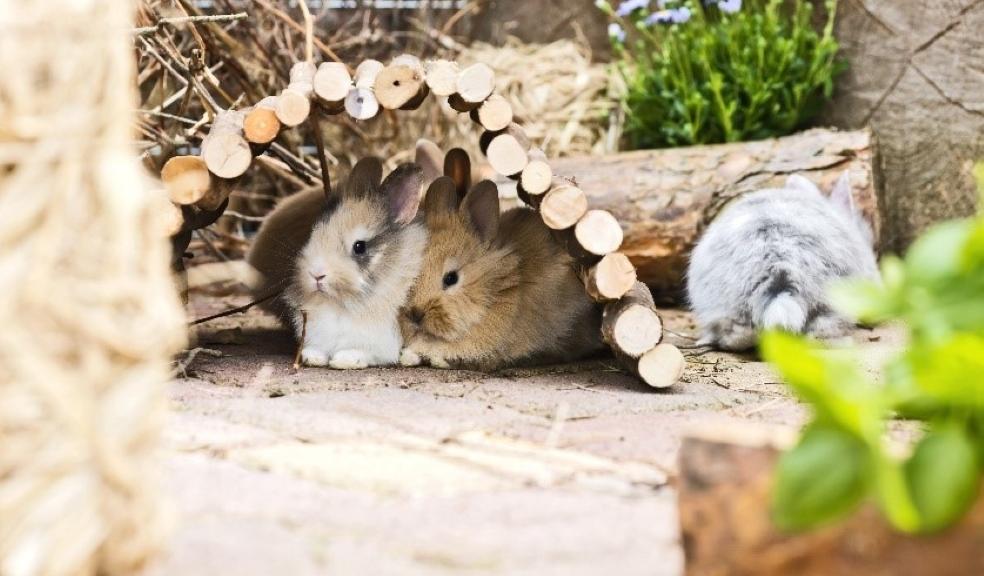
PDSA Weekly Pet Care Column: Keeping happy bunnies this Easter
With Easter around the corner, we're bound to see lots of Easter bunnies around from cards to bunny shaped sweet treats!
PDSA Vet Nurse Nina Downing shares the top tips for keeping bunnies at home.
Nina said: "Rabbits may seem like an 'easier' pet to have, but there's lots to know about rabbits, and they do require a lot of space, care and attention to keep them happy and healthy.
Rabbits need at least one bunny best friend
"If rabbits live alone, they can feel socially isolated and become bored, frustrated, anxious, and destructive. Fellow bunny companionship offers them warmth, comfort and company.
"Rabbits can happily live together in these combinations:
- a neutered male and a neutered female – often the most successful pairing.
- two litter brothers or two litter sisters – although there is no risk of pregnancy when you have rabbits of the same sex living together, it's still important to neuter to reduce the risk of fighting as they get older and to help prevent illness.
- a compatible group – rabbits can live in groups, but unless the rabbits are related and neutered early, bunny bonding can be harder to achieve.
"For the happiest bunnies, we suggest keeping a neutered male with a neutered female. If you can home a brother and sister together, that's ideal as they'll already know each other and will be less likely to fight."
Keeping your bunnies outdoors
-
Small hutches or cages don't allow for rabbits to exhibit their natural behaviours, making them unsuitable accommodation. Whilst rabbits are thought of as 'small pets', they do require a good amount of room to live a happy and healthy life. Their home needs to be at the very least 3m x 2m x 1m/10 ft x 6 ft x 3ft, but the bigger the better.
-
Inside your rabbit's accommodation should be a shelter, where they will relax, sleep, eat and drink, as well as hay, food and water bowls, a litter tray and a digging tray. Plus, plenty of toys and hiding spots!
-
They also need a large exercise area that they can use at all times – such as a run, secure area in your garden, or space in your home. Large enough for your rabbits to sprint, fully stretch out and stand up without their ears touching the top. This usually works out as at least around 3m x 2m x 1m/10ft x 6ft x 3ft (depending on the size of your rabbit), but we recommend providing much more than this.
Owning indoor rabbits
- Indoor rabbits need the same as outdoor rabbits – space, shelter, food, toys, hiding places, a litter tray and digging tray etc.
- Non-slip flooring is best so your rabbits don't injure themselves while hopping about.
- Ensure house cleaners and sprays are pet friendly and kept out of the way.
- Rabbits can jump very high and squeeze through quite narrow spaces -Take this into account when putting things 'out of reach'.
- Bunny-proof - it is very natural for a rabbit to chew, and they are likely to chew furniture, skirting boards and door frames that they have access to. If this is a problem, then the best way to avoid it is by keeping your rabbits in areas where they can't get at these things unsupervised and use plastic guards to protect the area. Protect any cables or wires and keep house plants out of paws reach.
- Outdoor space – all bunnies, including indoor bunnies need regular access to the outdoors so they get enough daylight and vitamin D, as well as the opportunity to spend time grazing.
PDSA is the UK's largest vet charity providing a vital service for pets across the UK whose owners struggle to afford treatment costs for their sick and injured pets. For many vulnerable pets, PDSA is there to help when there is nowhere else for their owners to turn.
Find out more about keeping your pets happy and healthy at pdsa.org.uk







